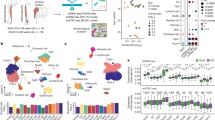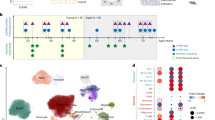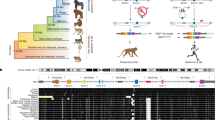Abstract
Hereditary spherocytosis (HS) is a common, clinically heterogeneous haemolytic anaemia1,2 in which the primary erythrocyte defect is believed to be some abnormality in the spectrin–actin membrane skeleton3,4, leading to loss of surface membrane5. Recessively inherited spectrin deficiency with extreme erythrocyte fragility and spherocytosis has been identified in certain mutant mice6,7 and two severely anaemic humans8. Although suspected, deficiency of spectrin has not been demonstrated in less severe forms of human HS9. We now report the quantitation of erythrocyte spectrin by radioimmunoassay. We found that normal erythrocytes contained 240,000 copies of spectrin heterodimer, whereas erythrocytes from 14 patients with a variety of types of HS were all partially deficient in spectrin (range 74,000–200,000 copies), the magnitude of the deficiency correlating with the severity of the disease. Spectrin deficiency of varying degrees is common in HS and probably represents the principal structural defect leading to loss of surface membrane.
This is a preview of subscription content, access via your institution
Access options
Subscribe to this journal
Receive 51 print issues and online access
$199.00 per year
only $3.90 per issue
Buy this article
- Purchase on Springer Link
- Instant access to full article PDF
Prices may be subject to local taxes which are calculated during checkout
Similar content being viewed by others
References
Dacie, J. V. in The Haemolytic Anemias: Congenital and Acquired 2nd edn, 82–150 (Grune & Stratton, New York, 1960).
Young, L. E. Trans. Ass. Am. Physns 68, 141–148 (1955).
Bennett, V. J. J. cell. Biochem. 18, 49–65 (1982).
Cohen, C. M. Semin. Hemat. 20, 141–168 (1983).
Cooper, R. A. & Jandl, J. H. J. clin. Invest. 48, 736–744 (1969).
Greenquist, A. C., Shohet, S. B. & Bernstein, S. E. Blood 51, 1149–1155 (1978).
Lux, S. E., Pease, B., Tomaselli, M. B., John, K. M. & Bernstein, S. E. in Normal and Abnormal Red Cell Membranes (eds Lux, S. E., Marchesi, V. T. & Fox, C. F.) 463–469 (Liss, New York, 1979).
Agre, P., Orringer, E. P. & Bennett, V. New Engl. J. Med. 306, 1155–1151 (1982).
Knowles, W., Marchesi, S. & Marchesi, V. T. Semin. Hemat. 20, 159–174 (1983).
Palek, J. & Lux, S. E. Semin. Hemat. 20, 189–224 (1983).
Fenner, C., Traut, R. R., Mason, D. T. & Wikman-Coffelt, J. Analyt. Biochem. 63, 595–602 (1975).
Bennett, V. Nature 281, 597–599 (1979).
Steck, T. L. J. Cell Biol. 62, 1–19 (1974).
Bennett, V. & Stenbuck, P. J. biol. Chem. 255, 6424–6432 (1980).
Bennett, V. Biochim. biophys. Acta 689, 475–484 (1982).
Castle, W. B. & Daland, G. A. Am. J. Physiol. 120, 371–383 (1937).
Shohet, S. B. J. clin. Invest. 64, 483–494 (1979).
Feo, C. J., Fischer, S., Piau, J. P., Grange, M. J. & Tchernia, G. Nouv. Revue fr. Hémat. 22, 315–325 (1980).
Tchernia, G., Mohandas, N. & Shohet, S. B. J. clin. Invest. 68, 454–460 (1981).
Bodine, D. M., Birkenmeier, C. S. & Barker, J. E. Cell 37, 721–729 (1984).
Goodman, S.R., Shiffer, K. A., Casoria, L. A. & Eyster, M. E. Blood 60, 779–784 (1982).
Wolfe, L. C., John, K. M., Falcone, J. C., Byrne, A. M. & Lux, S. E. New Engl. J. Med. 307, 1367–1374 (1982).
Lawler, J., Liu, S.-C., Palek, J. & Prchal, J. J. clin. Invest. 70, 1019–1030 (1982).
Knowles, W. J. et al. J. clin. Invest. 71, 1867–1877 (1983).
Palek, J., Liu, S.-C., Liu, P. Y., Prchal, J. & Castleberry, R. P. Blood 57, 130–139 (1981).
Zail, S. S. & Coetzer, T. L. J. clin. Invest. 74, 753–762 (1984).
Bennett, V. Meth. Enzym. 96, 313–324 (1983).
Fairbanks, G., Steck, T. L. & Wallach, D. F. H. Biochemistry 10, 2606–2617 (1971).
Kam, Z., Josephs, R., Eisenberg, H. & Gratzer, W. B. Biochemistry 16, 5568–5572 (1977).
Hunter, W. & Greenwood, F. Nature 194, 495–496 (1962).
O'Keefe, E. & Bennett, V. J. biol. Chem. 255, 561–568 (1980).
Author information
Authors and Affiliations
Rights and permissions
About this article
Cite this article
Agre, P., Casella, J., Zinkham, W. et al. Partial deficiency of erythrocyte spectrin in hereditary spherocytosis. Nature 314, 380–383 (1985). https://doi.org/10.1038/314380a0
Received:
Accepted:
Issue Date:
DOI: https://doi.org/10.1038/314380a0
This article is cited by
-
Vital erythrocyte phenomena: what can theory, modeling, and simulation offer?
Biomechanics and Modeling in Mechanobiology (2020)
-
Multiple loci influence erythrocyte phenotypes in the CHARGE Consortium
Nature Genetics (2009)
-
Structural alterations of rat erythrocytes induced by phosphacol poisoning
Bulletin of Experimental Biology and Medicine (1995)
Comments
By submitting a comment you agree to abide by our Terms and Community Guidelines. If you find something abusive or that does not comply with our terms or guidelines please flag it as inappropriate.



